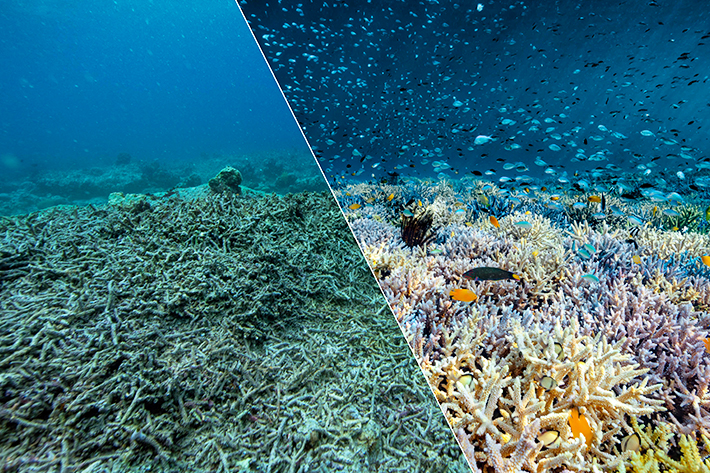Lawyers for three Pacific island nations formally lodged a submission to the International Criminal Court in New York on Monday that could dramatically transform the global response to the climate crisis.
The application by Vanuatu, backed by Fiji and Samoa, proposes that the ICC should formally recognise ‘ecocide’ as a serious, and punishable, international criminal offence, alongside genocide, crimes against humanity, war crimes, and the crime of aggression.
Activists have been arguing for seven years that ecocide – defined as “unlawful or wanton acts committed with knowledge that there is a substantial likelihood of severe and either widespread or long-term damage to the environment being caused by those acts” – must be designated as the world’s fifth atrocity crime.
ALSO SEE: Germany Rejects ‘Fake’ Chinese Carbon Credits Used by Oil Firms
Supporters, such as the Stop Ecocide International, say the move to amend the Rome Statute, the treaty that established the ICC in 2002, “has gained significant legal and political traction.”
It has been discussed at the United Nations and won further support early this year when Belgium became the first European country to pass a law that recognised ecocide as an international level crime.
The Belgian law aims to prevent and punish severe cases of environmental degradation, such as major oil spills, and targets top decision-makers, who could face up to 20 years in jail, plus corporations, which could face fines of up to 1.6 million euros ($1.77m).
In February, the ICC Prosecutor’s Office also launched public consultation on a “new policy initiative to advance accountability for environmental crimes under the Rome Statute.”
The Office said the move on how to manage environmental crimes seeks “to ensure that it takes a systematic approach to dealing with crimes within the Court’s jurisdiction committed by means of, or that result in, environmental damage”.
Then in March, the European Union issued a revised Environmental Crime Directive to tackle “conduct comparable to ecocide”.
Meanwhile, laws to counter ecocide are reportedly being pursued in Peru, Brazil, Scotland, Italy and Mexico.
‘Huge gap in international law’

The Stop Ecocide group quoted Philippe Sands, a professor of law at University College London, who was co-chair of the Independent Expert Panel for the Legal Definition of Ecocide, as saying: “There is a manifest gap in the Statute of the ICC, and ecocide is now firmly on the agenda, a vital and necessary moment for an effective international law.
“This development reflects a growing recognition that severe environmental destruction deserves the same legal accountability as other grave international crimes that focus on the human,” Sands said.
“I urge member states to support this initiative, to recognise that the Rome Statute as drafted cannot adequately address environmental harms, and that this is a moment of generational change, one that is needed to safeguard our environment and signal to coming generations that the world is truly serious about doing so.”
Vanuatu’s special envoy for climate change Ralph Regenvanu said his country first called for the ICC to recognise ecocide as a crime in 2019, because climate damage was ravaging the 80 islands in the Vanuatu archipelago – “devastating our island economy, submerging our territory, and threatening livelihoods.”
“This tragedy is not unique to Vanuatu but is shared by many small island nations that, despite bearing the least responsibility for the crisis, suffer most from its impacts. We are taking bold and necessary action to address these challenges and encourage other vulnerable states to take note of our newly tabled proposal,” Regenvanu said.
“Vanuatu considers it imperative that the international community takes this conversation seriously, and we warmly invite all member states to engage. Legal recognition of severe and widespread environmental harm holds significant potential to ensure justice and, crucially, to deter further destruction.”
The ICC is expected to fully discuss the proposal, but the process could take years because it is expected to “face fierce opposition,” according to a report by The Guardian, which said much of the debate was likely to be “behind the scenes as most countries will not wish to openly speak out against it.”
Barrier Reef ‘death blow’
The move in New York comes amid a flurry of troubling climate news. One of the most serious was a report from a conference in New Zealand, where a top climate scientist said it is likely that the Great Barrier Reef off northeastern Australia has been dealt “a death blow”.
Joëlle Gergis, from the University of Melbourne, told the Climate Change and Business Conference in Auckland that 80% of the reef was bleached in April – when water is so warm coral expels the algae that lives in its tissue, causing it to turn white. This was the first time damage had extended so far along the reef, the Radio New Zealand report said.
“Scientists know… it’s likely that the extensive reef-wide bleaching of this year has dealt the largest living structure on this planet its death blow,” Gergis was quoted as saying.
“It’s just not possible for some ecosystems to adapt to climate change and it’s dangerous to pretend that they can.”
Meanwhile, new research suggests methane emissions are rising faster than ever, despite 150 nations vowing to slash emissions by 30% this decade, according to a report by phys.org.
It said total annual emissions – driven primarily by coal mining, oil and gas production, raising of cattle and sheep, and decomposing food and organic waste in landfills – have increased by 61 million tons or 20% over the past two decades.
And a new report on the global plastic pollution crisis says “we need to cut consumption”, as waste management won’t solve the plastics problem.
In a related report, the Ocean Cleanup non-profit group, which has removed a million pounds of trash from the Great Pacific Garbage Patch between California and Hawaii over the past three years, said clearing the remaining 79,000 metric tons of plastic waste will cost billions of dollars over coming years and may need a more aggressive approach.
At current levels, the cleanup would take a decade and cost about $7.5 billion, the Netherlands-based group said in a press release, but computer models show a more aggressive approach would complete the job in half that time – five years – and cost $4 billion instead, the LA Times reported.
- Jim Pollard
NOTE: A photo of Prof Sands was put in this report, and the subhead amended on Sept 10, 2024.
ALSO SEE:
India Generates Fifth of World’s Plastic Emissions – SCMP
US, China ‘Narrow’ Gap on Climate Finance, Plan Methane Talks
Spotlight on Big Tech’s Power and Water Use Amid AI Surge
Call For Ban on Single-Use Plastics as UN Treaty Talks Restart
A Third of Carbon Credits Fail on New ‘High-Integrity’ Criteria
Carbon Offsets Mostly ‘Ineffective’, Slow Net Zero Shift – FT
‘Wealthy Nations’ Fossil Fuel Deals Threaten a Global Catastrophe’
Most Effective Climate Policies Identified in New Study






















